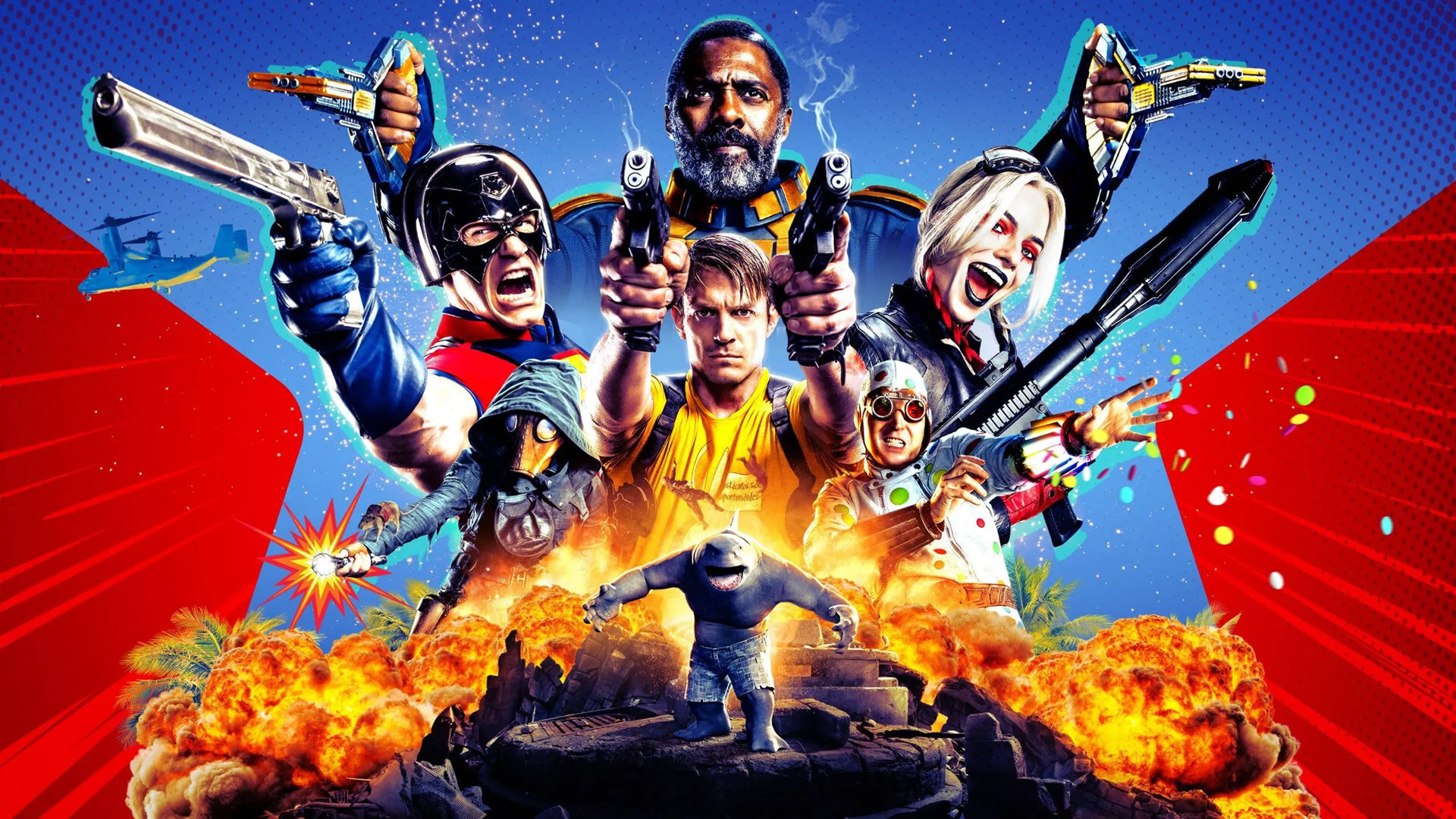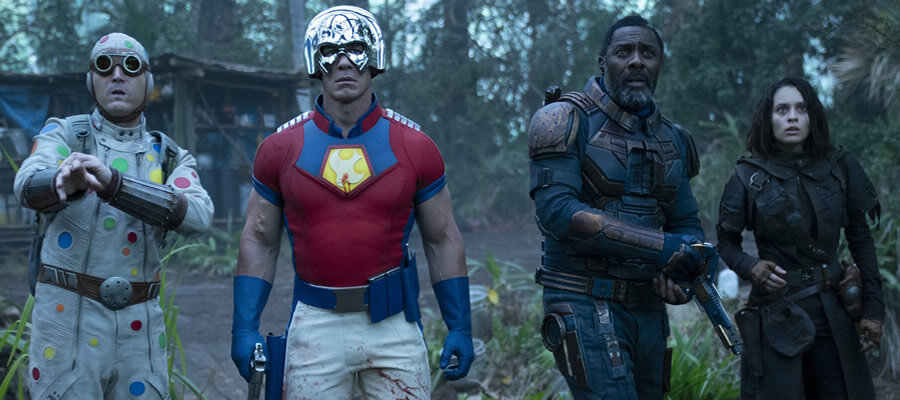The Suicide Squad (2021)
Unchained violence, irrepressible heart…
James Gunn’s DC Comics-film debut shows that care for characters and reverence to even esoteric source material can produce incredible cinematic results.
Starring Margot Robbie, Idris Elba, Joel Kinnaman, John Cena, Sylvester Stallone, Viola Davis, David Dastmalchian and Daniela Melchior
Released by Warner Bros. Pictures, HBO Max
Written and Directed by James Gunn
When Warner Bros. Pictures and DC Comics tried most visibly to craft their own alternative superhero cinematic universe to Marvel and Disney’s dominant offerings with two major releases in 2016, those efforts — though creating a group of deeply devoted fans in the process — were largely rejected by audiences. The immediate reaction to Batman v Superman: Dawn of Justice seemed to drive the studio into a panic, which resulted in a hastily re-edited and patched together August release in the form of the first feature film featuring the eponymous Suicide Squad.
While this reviewer personally appreciated the strength of the assembled ensemble of performers, the resulting film was arguably less well-received than even Dawn of Justice, and the former certainty that both fans and the studio had about an “extended” universe of DC Comics-based films was cast into doubt and uncertainty.
A lot has transpired since then. Not only have we gotten two versions of a big DC Comics team-up film in the form of the theatrical and director’s cuts of Justice League, but an entirely new set of characters beyond the most recognizable icons in Batman and Superman have taken up the baton of DC Films to drive the new release calendar into the future in films like Aquaman and Shazam!.
Batman’s next solo film coming next year appears wholly unconnected with the shared universe of films that has emerged, and Superman appears nowhere in sight in terms of Warner Bros.’ future plans. Instead, the franchise is led by Gal Gadot’s Wonder Woman, Jason Momoa’s Aquaman and Zachary Levi’s Shazam, and now it may very well be led by the Suicide Squad as reimagined in the newest DC Films release written and directed by James Gunn.
Gunn is quite a coup for Warner Bros., who was all too happy to pick him up after Disney abruptly and unwisely fired him from helming the third entry of a mega-franchise he helped spawn for the Marvel Cinematic Universe, Guardians of the Galaxy. Before Disney walked back that firing and re-hired Gunn for Guardians Vol. 3, however, Warner Bros. scooped him up resulting in this reimagined second film featuring DC Comics’ infamous “Task Force X.”
The Suicide Squad isn’t exactly a sequel to the 2016 film, nor is it exactly a reboot either. It makes sure that the toes of the prior work are not stepped on but also brings many of the characters that appeared in the previous film back to reprise their roles while also establishing a host of new, nearly scene-stealing characters that had never before been adapted from the pages of the comics.
Returning characters
The biggest returning additions to this new ensemble are Margot Robbie as Harley Quinn, Joel Kinnaman as Col. Rick Flag and the incomparable Viola Davis as the Squad’s handler, the shady Amanda Waller. In addition to providing just enough connective tissue to the previous film to avoid a needless descent into over-exposition, each returning character seems to be allowed more leeway to be both more recognizable to their comic book counterparts, as well as more freedom to be more resonant among the whole group we see.
Clearly, Harley Quinn is the biggest returning addition, and the performance in this role marks Robbie’s third time playing the character after the 2016 Suicide Squad film and last year’s under-appreciated Birds of Prey (and the Fantabulous Emancipation of One Harley Quinn). Robbie’s performance in concert with Gunn’s script provides a whole new, previously-unseen dimension to Harley that leans more into the conception of her as a strangely repentant, though still careless killer, while giving additional credence to the emancipatory development we saw in Birds of Prey. Robbie herself still seems to take significant enjoyment in her portrayal of Harley, which pairs exceedingly well with Gunn’s gleeful direction of organized mayhem.
Kinnaman’s return as Col. Flag is similarly less restrained, allowing for more of an individual flourish and less of the overt resentment we often see from Flag when placed in charge of the collection of misfits and killers that often makes up the Squad. In fact, he seems to care about his teammates in a way that feels different, but the story on display here also makes it feel earned. This is especially true of the few returning characters on the core team, but also applies well to a couple of key new additions in a way that makes Flag more outwardly heroic than he appeared last time around.
Davis’ second turn as Amanda Waller begins even more detached than we’d seen her in the previous film, but grows more consumed and unhinged as time goes on rivalling even Harley’s casual relationship with composure. Davis is one of the best performers working today, and her unique brand of devotion to her roles continues to come through in one of DC Films’ best cast roles.
New characters
The Suicide Squad also brings with it a whole host of great new characters from the less seen corners of the DC Comics Universe. Led primarily by Idris Elba as Robert DuBois/Bloodsport, John Cena as Christopher Smith/Peacemaker, Daniela Melchior as Cleo Cazo/Ratcatcher II, David Dastmalchian as Abner Krill/Polka-Dot Man and Sylvester Stallone as the voice of Nanaue/King Shark, these new characters — in addition to being pure joy to see fully-realized on-screen in a major motion picture for the truly DC faithful — combine into a shockingly great ensemble because of their competing personalities, power and skill sets.
Bloodsport is the clear embodiment of the group’s leadership in the film. A relatively low-level villain introduced in the earliest days of writer-artist John Byrne’s run on the ongoing Superman title in the late 1980s, Gunn’s script and Elba’s performance offer up greater dimension than he ever had on the page as well as a depth and nuance that makes the character one to root for. While in places it seems clear that Bloodsport and the character of Floyd Lawton/Deadshot may have been swapped out at some point in the script stage, the movie is better for it by allowing a whole new character to flourish under the acumen of Elba’s performance. He provides a great anchor for the experience.
Peacemaker is a character with roots going back to the mid-1960s, with only piecemeal appearances in the source material over the past 50 years most recently in the Geoff Johns/Gary Frank maxi-series Doomsday Clock. That relatively short resume still manages to remain truthful in Cena’s performance and Gunn’s writing and direction, however, as his overriding jingoism gives way to a twisted view of what it takes to proliferate peace for good people: by any means necessary, even if that often means the opposite of peace.
Cena brings a straght-laced posture to the performance with a degree of viciousness lurking just below the surface. Moments of humor are often punctuated by the immense skill that Peacemaker brings to bear when dispatching his enemies, and you get the distinct impression that with all of the vaunted talk about keeping peace, he enjoys what he does most when he’s killing dozens of people all around him. It’s easy to see why Peacemaker is going to lead his own series on HBO Max in the future; it should be extremely entertaining to see this character again.
Polka-Dot Man, Ratcatcher II and King Shark all bring a surprising level of heart to the film, with Polka-Dot Man’s clear mental instability balanced out by Ratcatcher’s earnestness and King Shark’s blunt, vile but strangely innocent lovability. Ratcatcher is the most important player of the trio since she helps to provide something of a Rorschach test for many different members of the team in embodying what they’re aiming to do in stopping the threat presented by the plot.
The story
The story of the film is not its most defining feature, because it feels like the plot is secondary to the character work on display. Nevertheless, the plot really kicks into high gear in the third act, and chances are that longtime DC Comics fans are going to go nuts seeing the things that they’ll see on-screen in the final third of the film. This is also where the thematic components of the story come into far clearer view.
You won’t find any major details of the plot here, but suffice it to say that there is a broader message to the proceedings that help bring this band of characters that certainly don’t look — or act — the part of heroes to become invested in the things around them. Part of that is derived from the primary setting of the movie, while the disparate points of view exhibited by everyone manages to make the necessity of action a foregone conclusion even in the face of…well, suicide. It’s right there in the title.
The Suicide Squad is yet another example of the strength that DC Comics-based films can have when the director is given an appropriate amount of freedom to use the source material’s mythology to help assist in the weaving of a story. This is the most esoteric DC Comics movie I’ve ever seen, and where conventional wisdom might tell someone that a trait like that would turn people off of engaging, this film should hopefully prove that preconceived notion totally wrong.
Those references are there for those that recognize them, but for the uninitiated fan who will be exposed to these characters for the very first time, they get everything they need to know in the film itself. The filmmaker knows and relays just enough about them to create truthful adaptations, bolstering them where necessary to create three-dimensional human beings that anyone can become invested in.
The Suicide Squad is a home run, and here’s hoping that it’s just the first of many such films from Warner Bros. and DC Films to come.






